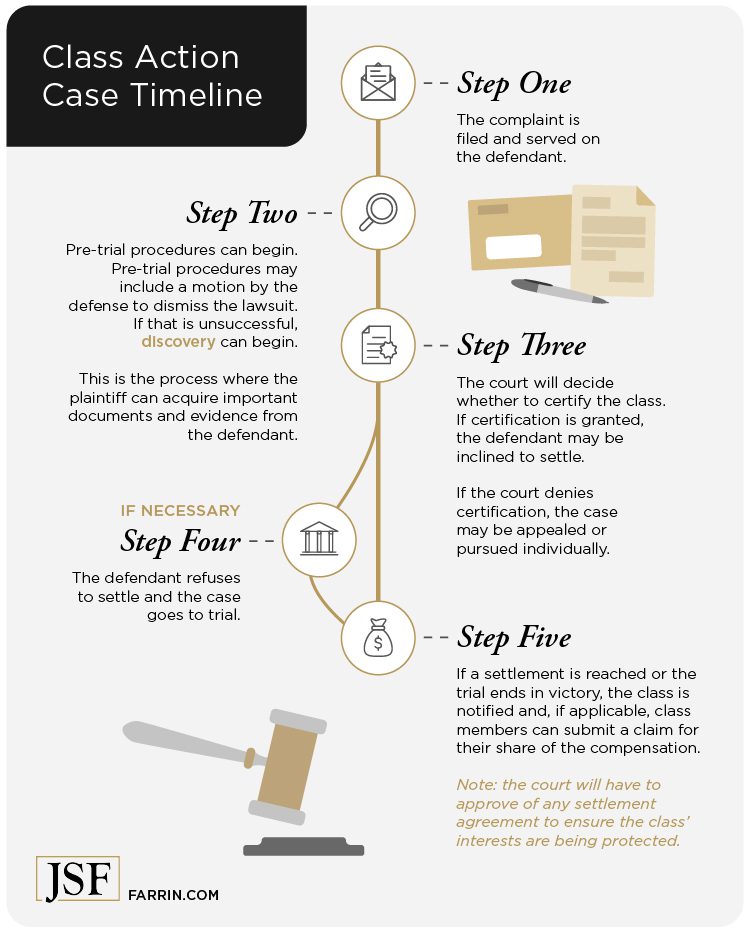Do you have a class action lawsuit?
If you have been harmed by corporate misconduct, we can help you fight for justice on behalf of everyone who’s been affected.
Our Class Action Lawyers Help People by Pursuing Large, Complex Legal Suits
Have you and others been harmed by the negligence of a large organization, but felt powerless to fight back? There is a valuable tool called a class action lawsuit that can be used to bring groups of individuals together to collectively sue a corporation, government, or another large entity for wrongful conduct.
Our class action lawyers can help:
Lead plaintiffs (or class representatives) – People who are willing to represent the group, or class, in a lawsuit and who have a case against the corporate defendant that reflects the class as a whole.
Lead plaintiffs work directly with class action lawyers in decision-making and typically participate in depositions, pre-trial hearing, trials, and settlement talks.
If you think the harm inflicted on you and others could be the grounds for a class action, we have the experience and resources to guide you through the complicated process. Our team of experienced class action lawyers is led by Gary Jackson,* who has taken on these and other giants during his career:
- State of North Carolina
- CVS
- Bank of America
- DuPont
- Audible
- Capital One
- JPMorgan Chase
Should you file a class action lawsuit? We can evaluate your case for free and give you clarity with no obligation. Call the Law Offices of James Scott Farrin at 1-866-900-7078 today.
Class Action Lawyers Help Individuals Harmed by Corporate Misconduct Navigate the Steps of a Class Action
Sometimes an individual claim is not practical to pursue. But when a company’s or government’s wrongful behavior repeatedly harms a large number of victims in the same way, they can assemble together to fight for compensation through a class action lawsuit.
Class action lawsuits can be complex, and an attorney can help you decide whether you have the grounds for a class action, if you should proceed as the lead plaintiff, and what this responsibility involves.
A class action lawyer can help you navigate the five steps of a class action lawsuit:
Filing an Initial Complaint for a Group Lawsuit
If you feel that you and others have suffered a legal wrong and you want to file a class action lawsuit, the first step is to talk to an experienced class action attorney to understand whether your case may qualify, and then they can file your complaint with the appropriate court.
Your attorney can help you determine the answer to these and other key questions:
- Do you have an actual legal case? And is it common to all members of the class?
- Are there common questions in the claim that the court can answer?
- Are members of the class easily identifiable based on objective criteria?
- Do you have enough class members?
- If you are the lead plaintiff, are you a good representative of all the members of the class, and are you free from any conflicts of interest?
If you want to act as the lead plaintiff, your attorney can help you file an initial complaint with a court that has sufficient connections to the claim to have jurisdiction over it. In class actions, an attorney’s involvement is critical in evaluating the strength of the case and where it may be filed.
Our class action lawyers have significant experience working with class action clients in North and South Carolina to build thorough initial complaints and file the complaints with the appropriate courts.
Who Makes a Good Lead Plaintiff?
While many people are affected by corporate misconduct, it takes a brave person to stand up and fight it. Successful lead plaintiffs generally share a commitment to three foundational characteristics.
Lead plaintiffs should be:
- Principled – Are you infuriated when you see corporate misconduct? Lead plaintiffs are often outraged when they witness an organization (whether it’s a company or a government entity) take advantage of others. And lead plaintiffs must be honest since they will be representing an entire class of people in a lawsuit.
- Empathetic – Do you want to help others? Do you want to make a positive impact on others by righting a wrong? Lead plaintiffs should be driven to seek compensation that they and others (sometimes thousands, or even hundreds of thousands of people) may deserve.
- Motivated – Are you willing to go the extra mile? Lead plaintiffs are involved in the lawsuit and must be willing to give their time and information, as needed.
If the above list sounds like you, you don’t have to fight this battle on your own. The bulk of the work will fall on the shoulders of your class action lawyer who can guide you through the legal process.
Other individuals may have the opportunity to recover if the court certifies the class and notifies them that they are members of the class.Your potential role as a lead plaintiff will be a supporting role, and your main job will be to truthfully answer the questions asked of you. Your lawyer will be the one who will spend the time and resources gathering evidence, interviewing expert witnesses, and building a strong case to try to prove the other side’s misconduct.
So, choose your class action lawyer wisely.
How to Choose a Class Action Lawyer
Class actions can be extremely complex cases with high stakes, and choosing the right lawyer for you can make a significant difference.
Look for a law firm with:
- Resources –Your team should have the human and financial resources to sustain a lengthy and aggressive fight.
- A focus on your interests– You want a legal team that will put your needs first, shares your desire to right this corporate misconduct, and is committed to seeking justice for those who have been wronged.
- Experience– You want skilled advocates in your corner who have successfully stood up to powerful adversaries in class actions.
If you believe you have a class action case, you can prepare for your possible role of lead plaintiff by collecting evidence of the wrongdoing. And one of your most important responsibilities if you think you may make a good lead plaintiff is to carefully select an experienced class action lawyer who will fight for compensation for you and the other members of the class.
Call the Law Offices of James Scott Farrin at 1-866-900-7078 or contact us online for a free case evaluation. We can give you clarity on your case at no cost or obligation.
We Seek Maximum Compensation for You in Class Action Lawsuits
Helping clients seek compensation in class actions is an integral part of who we are as a firm. We led one of the largest civil rights class action cases in U.S. history. It took years of hard work and dedication, but that class action lawsuit settled for $1.25 billion and compensation for over 15,700 Black farmers.1,3
We don’t stand by when individuals are harmed by the negligence of large organizations or the government if we can help – instead, we often fight to try to hold these entities accountable. We believe that class action lawsuits send a powerful message to those that place profits above fairness and public safety.
Following are some of the class action lawsuits in which our team is currently involved:
- North Carolina State Retirees Class Action Lawsuit
Attorney Gary Jackson,* as co-lead counsel, is working with a team of class action lawyers to try to restore retirement health benefits to more than 220,000 North Carolina state retirees. A judge has already certified the class and ruled that the state breached its contract with retirees by charging higher premiums.1
- Winston Weaver Fertilizer Plant Fire Class Action Lawsuit
The Law Offices of James Scott Farrin is pursuing a class action complaint against the Winston Weaver Company to obtain economic damages for approximately 6,000 residents dislocated after a massive explosion at the company’s fertilizer plant.
- GenX Contamination Class Action Lawsuit
As a member of the Plaintiffs’ Steering Committee, Gary Jackson* is taking on DuPont and Chemours in a class action for their release of “forever chemicals” (PFAS and GenX) that contaminated the Cape Fear River water supply. After more than six years of litigation, the judge has recently certified the class for a lawsuit seeking compensation for property-related economic damages.1
- WakeMed Data-Sharing Class Action Lawsuit
In November 2022, James Scott Farrin attorneys Gary Jackson* and Tom Wilmoth filed a class action lawsuit against WakeMed Health and Hospitals regarding the unauthorized sharing of almost a half a million patients’ data with Meta (Facebook).
- Audible Royalties Class Action Lawsuit
We continue to pursue a class action lawsuit against Audible for withholding royalties from thousands of authors for audio distribution rights on books.
- Bank of America Unauthorized Account Openings Class Action Lawsuit
We are representing individuals claiming that the bank processed unauthorized account applications in a class action lawsuit.
Get Your Free Case Evaluation Today and Get Clarity on Your Case
If you need a committed class action lawyer to help you understand your rights and fight for compensation, you can visit one of our offices, or we can come to you, anywhere throughout North and South Carolina.
We strive to provide excellent representation for our clients. Our experience with class actions speaks for itself – we know how to handle the details and fight for you and the others in the class. We have even built a nationally-recognized system to help our efforts, including our proprietary case management software that allows us to handle the often challenging logistics of class action lawsuits.
Since our firm began, we’ve recovered more than $2 billion total for more than 73,000 people. And that doesn’t include the $1.25 billion settlement we achieved in the historic Black Farmers class action lawsuit.1,3
To help you pursue justice on behalf of the class, we don’t collect an attorney’s fee unless we recover for you. It does not matter how many hours we may spend building your case (and there can be plenty). No win, no attorney fee: Guaranteed.2
To see if you have a case as lead plaintiff in a class action, call us at 1-866-900-7078 or contact us online today for a free case evaluation.
Class action cases are often heard in other states or federal courts. For this reason, our James Scott Farrin class action lawsuit attorneys work closely with other law firms nationally to try to make sure clients have the legal representation they need.
*Of Counsel





